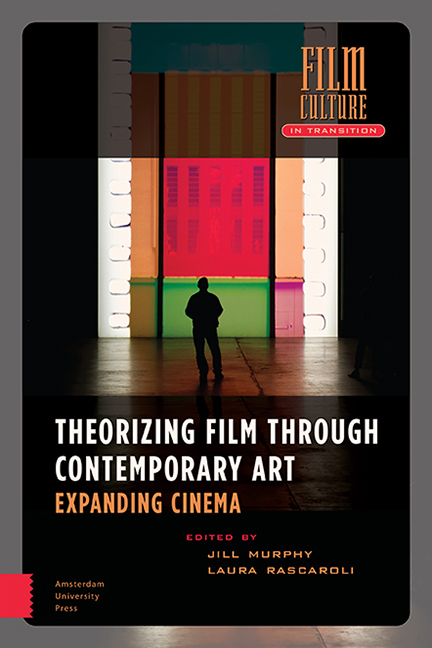Book contents
- Frontmater
- Dedication
- Contents
- List of Illustrations
- Acknowledgments
- Foreword: Courtesy of the Artists
- Introduction: On Cinema Expanding
- Part One Materialities
- 1 Cinema as (In)Visible Object; Looking, Making, and Remaking
- 2 Objects in Time; Artefacts in Artists’ Moving Image
- 3 Materializing the Body of the Actor; Labour, Memory, and Storage
- 4 How to Spell ‘Film’; Gibson + Recoder’s Alphabet of Projection
- Part Two Immaterialities
- 5 The Magic of Shadows; Distancing and Exposure in William Kentridge’s More Sweetly Play the Dance
- 6 Douglas Gordon and the Gallery of the Mind
- 7 A Throw of the Dice Will Never Abolish Chance; Tacita Dean’s Section Cinema (Homage to Marcel Broodthaers)
- Part Three Temporalities
- 8 The Photo-Filmic Diorama
- 9 The Cinematic Dispositif and Its Ghost; Sugimoto’s Theaters
- 10 Time/Frame: On Cinematic Duration
- Part Four The Futures of the Image
- 11 Interactivity without Control; David OReilly’s Everything (2017) and the Representation of Totality
- 12 Post-Cinematic Unframing
- 13 Absolute Immanence
- Index
13 - Absolute Immanence
Published online by Cambridge University Press: 23 June 2021
- Frontmater
- Dedication
- Contents
- List of Illustrations
- Acknowledgments
- Foreword: Courtesy of the Artists
- Introduction: On Cinema Expanding
- Part One Materialities
- 1 Cinema as (In)Visible Object; Looking, Making, and Remaking
- 2 Objects in Time; Artefacts in Artists’ Moving Image
- 3 Materializing the Body of the Actor; Labour, Memory, and Storage
- 4 How to Spell ‘Film’; Gibson + Recoder’s Alphabet of Projection
- Part Two Immaterialities
- 5 The Magic of Shadows; Distancing and Exposure in William Kentridge’s More Sweetly Play the Dance
- 6 Douglas Gordon and the Gallery of the Mind
- 7 A Throw of the Dice Will Never Abolish Chance; Tacita Dean’s Section Cinema (Homage to Marcel Broodthaers)
- Part Three Temporalities
- 8 The Photo-Filmic Diorama
- 9 The Cinematic Dispositif and Its Ghost; Sugimoto’s Theaters
- 10 Time/Frame: On Cinematic Duration
- Part Four The Futures of the Image
- 11 Interactivity without Control; David OReilly’s Everything (2017) and the Representation of Totality
- 12 Post-Cinematic Unframing
- 13 Absolute Immanence
- Index
Summary
Abstract
The defining question of modern art was how to release the image from representation. The problem for contemporary art is how to find new approaches, materials, techniques, and technologies for remapping this question in ways responsive to our current history and media environment. What has the image become under new conditions of technological production and reproduction, amplified flows of communication through social and mass media, and the global expansion of neoliberalism, both politically and economically? In this chapter, Rodowick appeals to Theodor Adorno's late writings on aesthetics to evaluate contemporary art's critical responses to its current technological and social condition in works by Philippe Parreno, Sturtevant, Pierre Huyghe, Michel Majerus, Cory Arcangel, and other international artists.
Keywords: Contemporary art, art and capitalism, art and politics, Adorno, aesthetic theory, utopia
On behalf of what cannot be exchanged, art must through its form bring the exchangeable to critical self-consciousness (T. W. Adorno).
The defining question of modern art was how to release the image from representation. The problem for contemporary art is how to find new approaches, materials, techniques, and technologies for remapping this question in ways responsive to our current history and media environment. What has the image become under new conditions of technological production and reproduction, amplified flows of communication through social and mass media, and the global expansion of neoliberalism, both politically and economically? Then again, perhaps we have lost faith entirely in the concept of ‘representation’, or the image's capacity to stand for, to stand in for, or to give voice or meaning to one thing by another thing?
From Walter Benjamin came modernity's lesson that technological reproducibility promotes the disappearance of the original in a cloud of copies. In turn, Jean Baudrillard voiced postmodernism's assertion that because the very distinction between originals and copies has disappeared, there is now only simulation without any referent. In my view, Baudrillard's concept of simulation was entirely discredited, rather than proven, by the historical facts of the two Gulf Wars, September 11, and every act of terror and mediated violence that followed.
- Type
- Chapter
- Information
- Theorizing Film Through Contemporary ArtExpanding Cinema, pp. 277 - 292Publisher: Amsterdam University PressPrint publication year: 2020



